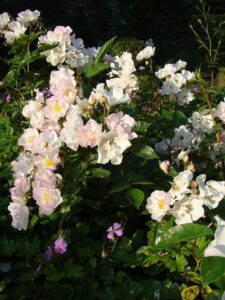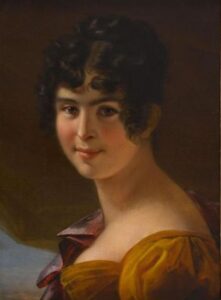Roses
Poésie & Pepita
‘My life is your life, your life is mine, you live what I live; destiny is one. So take this mirror, and look at yourself in it.’
Preface to Les Contemplations, 1856.
‘No, no, no, the truth, educating the masses, human freedom, conscience are not goals to be looked down on. Being the great servant takes nothing away from the poet.’ William Shakespeare, 1864

Rosa Poésie,(R) LENBamo, Hybrid musk, Lens, Belgium, 1984
Victor Hugo wrote 153,000 lines of verse. Although he does not seem to have started writing poetry until his early teens, he was soon something of a prodigy, winning a special prize at the prestigious ‘Floral Games’ poetry competition at the age of 17. This competition, held in Toulouse in the south of France, is centuries old, and has its roots in the poetry of the troubadours. Hugo won his ‘golden lily’ over his future friend, Alphonse de Lamartine. In France Victor Hugo, although a consummate novelist, artist, campaigner, letter-writer, politician and humanitarian, has been historically most esteemed for his poetry. Lines of poetry can be found scattered throughout his novels and his notebooks; he worked incessantly at his art, practising rhyming schemes with a dictionary and noting down good lines as he thought of them for use later.
For Victor Hugo, poetry was not just an end in itself; it was a priceless tool which could, and should, be used to educate people and help mankind solve the pressing problems with which they were faced in the 19th century as progress brought about change both good and bad. Hugo saw himself as filtering the ideas and visions he had through his own soul. He was Everyman, struggling with the truth on behalf of Everyman. The outcome was poetry, or poetry expressed as novels or plays. There was but one destiny for all of nature, including mankind. Nature and humanity are one: they share a common soul; for him, poetry was ‘the soul in bloom’.
Although during his exile Victor Hugo turned more towards the novel as the popular medium of bringing about change, he never stopped writing poetry or using it as an instrument of instruction and enlightenment, for his readers and for himself.
‘I have never said, “art for art’s sake”; I have always said, “art for progress’ sake.” ‘
The messages of his poetry remain the same whatever their setting; a classical idyll and a contemporary love story are fundamentally one and the same. He and other poets of a like mind adopted the archaic spelling of the French word for poetry, not poésie, but poësie, nearer to its origins in the ancient Greek poiesis.

Victor Hugo spent part of his boyhood in Spain when he went to join his father, a general in Napoleon’s Army, in Madrid. He and his brothers attended school there. The intensity of the experience marked him for life, deeply, and Spain and the Spanish language make frequent and significant appearances in his work. Young Spanish girls often appear in his poetry but are at least in part an allusion to his wife, Adèle Foucher. They were both very young when they met and Adèle was beautiful, with very dark shining hair and eyes. Their families lived opposite each other and he represents them as having fallen in love in the garden at Les Feuillantines; his mother had in fact left there in 1810, but as a teenager he and his brother had returned to live nearby, as they had been left in the care of Adèle’s family. In The Last Day of a A Condemned Man, written in 1829, Hugo devotes a chapter to the convict’s vivid memory of a young Andalucian girl named Pepa, known to him when they were children as Pepita. The garden in which he and Pepita played as children and meet again as teenagers, sharing a kiss over a book, shares many features with the garden at Les Feuillantines – the unnamed convict describes himself as running with his brothers along the green tree-lined path of ‘that wild garden where I spent my earliest years‘; the description of the garden and the idyllic scenes of the beginning of young love resemble those in Hugo’s ‘autobiographical’ poems.
‘Pepita‘ is also the subject of a poem’ in the collection The art of being a grandfather, published in 1877. Hugo had already written about a Spanish girl he met in Madrid, the daughter of a marquis. This Pepita is described as blonde and at sixteen somewhat older than he was (he was not even 10!); later he claimed that on a return visit to Spain in 1843 with Juliette Drouet he tried to find the house where he had spent time with Pepita, who had read to him, but he was unable to locate it, so much had things changed. This is perhaps a reference to the breakdown of the relationship with his wife, who had betrayed him years earlier. There may also be a political allusion: the politics of Spain were very unstable. Spain, with its borders in the Pyrenees, felt partly French. Victor Hugo was always keen to encourage the Spanish, who were behind in many economic and social aspects, to choose to take what he saw as their rightful place alongside the rest of Europe.
Hugo wrote several beautiful and musical poems in the style of Spanish songs; ‘Pepita’ is one of them.
In Spain, in my beloved Spain,
O Spring! O dawn so distant!
At eight, I was Pepita’s swain,
Though close to non-existent. …
‘My name is Pepa, boy’ (she spoke),
‘My father is a grande’.
Amongst a folk beneath a yoke,
I thought myself a dandy.’ …
[From How to be a Grandfather, translated by Timothy Adès
‘Pepita’ is a gallica rose raised by Moreau in the mid-19th century. Its small white flowers are striped with pink.



